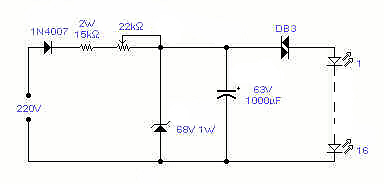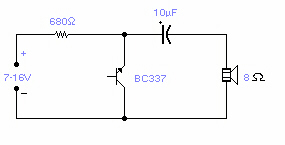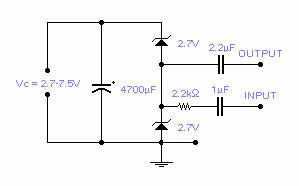These are some of the electronic circuits I devised and implemented in the past. They are easy to realize and although each circuit comes with some essential information I expect you to be familiar with electronic assemblies and take all necessary safety precautions where applicable. This is copyrighted material but is free for you to implement provided it is not commercially exploited.
![]()
Multiple led flasher SCR inverter
Geomagnetic field detector Sound triggered flash
Reverse bias oscillator Noise generator
Seismic detector Electronic I Ching
Electronic attenuator Windscreen loop aerial
Telephone line monitor Zero crossing AC switch oscillator
Power flasher High voltage generator
SCR oscillator Sensitive geomagnetic detector
Zener oscillators Basic infrared TX-RX
220V mains monitor Baluns & coaxial aerials
Ultra low frequency receiver Single led flasher
Electric field detector Long delay timer
Mains frequency meter Electronic relay
Minimal audio oscillators Alkaline charger
![]()
MULTIPLE LED FLASHER
 This circuit will flash a
string of LED's, typically 16, with direct connection to the mains and with a period
adjustable between 1 and 4 seconds depending on the setting of the 22K/1W pot. Operation
at 110V should also be possible but has not been tested. It can be used as a Christmas
Tree decoration, entertainment in general or to flash a symbol made out of LED's - WARNING
- this circuit is implemented at your own risk! It operates directly out of the mains and
proper precautions must be taken.
This circuit will flash a
string of LED's, typically 16, with direct connection to the mains and with a period
adjustable between 1 and 4 seconds depending on the setting of the 22K/1W pot. Operation
at 110V should also be possible but has not been tested. It can be used as a Christmas
Tree decoration, entertainment in general or to flash a symbol made out of LED's - WARNING
- this circuit is implemented at your own risk! It operates directly out of the mains and
proper precautions must be taken.
GEOMAGNETIC FIELD DETECTOR
 This basic oscillator will
detect the Earth magnetic field. The ferrite rod and coil are taken from an old Medium
Wave receiver and a small magnet is glued at one end. Tune to a medium wave commercial
station until you hear a beat note. Any movement of the ferrite rod will produce an
audible note that depends on the prevailing Earth magnetic field. Screening is essential.
Use a plastic box padded, on the inside, with copper wires running parallel to the rod and
grounded in one place only. A small hole is made in the box in order to adjust the trimmer
capacitor with a plastic screwdriver. An American equivalent to the BC337 could be the
2N2369A but I did not try it out.
This basic oscillator will
detect the Earth magnetic field. The ferrite rod and coil are taken from an old Medium
Wave receiver and a small magnet is glued at one end. Tune to a medium wave commercial
station until you hear a beat note. Any movement of the ferrite rod will produce an
audible note that depends on the prevailing Earth magnetic field. Screening is essential.
Use a plastic box padded, on the inside, with copper wires running parallel to the rod and
grounded in one place only. A small hole is made in the box in order to adjust the trimmer
capacitor with a plastic screwdriver. An American equivalent to the BC337 could be the
2N2369A but I did not try it out.
REVERSE BIAS OSCILLATOR
 There are a number of npn
transistors that will oscillate in the audio range when reverse biased. Minimum supply
voltage is 7V for low power transistors such as BC109, BC238 and 2N2222A (about 10V for
the latter), it becomes 12V for medium power transistors such as BD139 and is 16V for
power transistors as BUX22 and 2N6543. Current drain is 4mA at 9V and frequency of
oscillation is 550Hz. The base is normally left open.
There are a number of npn
transistors that will oscillate in the audio range when reverse biased. Minimum supply
voltage is 7V for low power transistors such as BC109, BC238 and 2N2222A (about 10V for
the latter), it becomes 12V for medium power transistors such as BD139 and is 16V for
power transistors as BUX22 and 2N6543. Current drain is 4mA at 9V and frequency of
oscillation is 550Hz. The base is normally left open.
SEISMIC DETECTOR
 The piezoelectric element
of a kitchen gas lighter is used in this simple, yet effective seismic detector. The piezo
element must be placed vertically, one end solidly to ground. A 2-3 pound weight of fine
gravel in a loose package should be placed on top at the other end. The high voltage lead
goes to the IC, placed close to the piezo element. The whole box is acoustically and
electromagnetically screened. A 3 core shielded cable brings the signal to the rest of the
circuit and to the power supply (+/- 15V). The SB140 diodes are Schottky type and pin 8
(substrate) of the IC should be connected to ground.
The piezoelectric element
of a kitchen gas lighter is used in this simple, yet effective seismic detector. The piezo
element must be placed vertically, one end solidly to ground. A 2-3 pound weight of fine
gravel in a loose package should be placed on top at the other end. The high voltage lead
goes to the IC, placed close to the piezo element. The whole box is acoustically and
electromagnetically screened. A 3 core shielded cable brings the signal to the rest of the
circuit and to the power supply (+/- 15V). The SB140 diodes are Schottky type and pin 8
(substrate) of the IC should be connected to ground.
ELECTRONIC ATTENUATOR
 Two low voltage, low power
zeners are used to control electronically the level of an audio signal. The attenuation
range is from 6 to 58dB for an input current from 0.042 to 77 mA corresponding to a
control voltage from 2.7 to 7.5V. If control voltage is limited to 5V, the attenuation is
around 30dB at a control current of 2mA. This is not an HiFi attenuator but might come
useful as a general purpose audio attenuator.
Two low voltage, low power
zeners are used to control electronically the level of an audio signal. The attenuation
range is from 6 to 58dB for an input current from 0.042 to 77 mA corresponding to a
control voltage from 2.7 to 7.5V. If control voltage is limited to 5V, the attenuation is
around 30dB at a control current of 2mA. This is not an HiFi attenuator but might come
useful as a general purpose audio attenuator.
TELEPHONE LINE MONITOR
 If you feel that somebody
is tampering with your telephone line you might find this little circuit useful. It
detects if there is another telephone connected to the line, if there is a short or an
open line. Sound and a flashing light will tell you which is the current situation. The
speaker is practically cut out during a normal conversation thus preserving privacy, only
the LED will flash occasionally. The circuit does not require any battery and takes the
supply from the telephone line itself. The transistors used are wired in a reversed biased
fashion thus behaving as oscillators. You might try the 2N2222A as an alternative (not
tested, you may need to increase the zener to 10V for the 2N2222A). This monitor is, of
course, suitable only for analogue lines. Watch the polarity of the input line: the
circuit will not be damaged by a polarity reversal but it will not operate correctly.
If you feel that somebody
is tampering with your telephone line you might find this little circuit useful. It
detects if there is another telephone connected to the line, if there is a short or an
open line. Sound and a flashing light will tell you which is the current situation. The
speaker is practically cut out during a normal conversation thus preserving privacy, only
the LED will flash occasionally. The circuit does not require any battery and takes the
supply from the telephone line itself. The transistors used are wired in a reversed biased
fashion thus behaving as oscillators. You might try the 2N2222A as an alternative (not
tested, you may need to increase the zener to 10V for the 2N2222A). This monitor is, of
course, suitable only for analogue lines. Watch the polarity of the input line: the
circuit will not be damaged by a polarity reversal but it will not operate correctly.
![]() I wish to see more of it
I wish to see more of it
![]() I rather go back to the surface
I rather go back to the surface
![]()